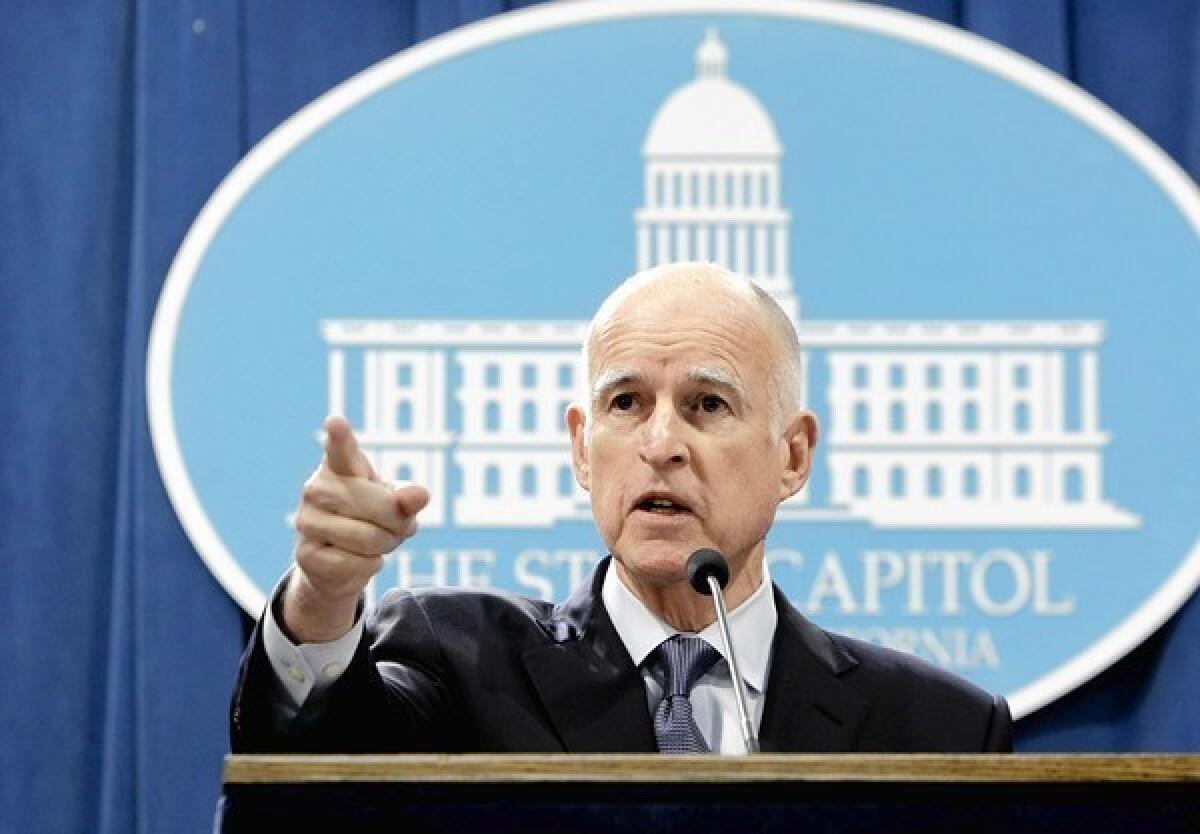Prop. 30 win gives Jerry Brown major boost

SACRAMENTO â Just a few weeks ago, as support for Gov. Jerry Brownâs tax initiative appeared to falter, some of his fellow Democrats were saying privately that he might be serving his last term.
None of them are saying that now.
Brown has emerged from his successful tax fight with replenished political capital, his experience and instinct trumping conventional wisdom.
âHis standing in the Capitol is probably higher than it has ever been,â said Tony Quinn, co-editor of the California Target Book, which monitors political races. âNow we have a strong governor.... He is going to be able to get his way a lot more.â
A loss at the ballot box would have been catastrophic for Brown politically. It also would have devastated education budgets throughout the state. The passage of Proposition 30 addressed both scenarios.
Now, the Democrats who won record-high numbers in the Legislature on Tuesday will owe him for the billions of dollars theyâll have to balance the budget. The business interests who fear what a supermajority of Democrats might do with new, unilateral power will be eager to work with the moderate governor. They may see the pragmatic Brown as a check on a hostile Legislature.
Brown himself is already talking about the next steps in the stateâs bullet-train program and about moving on a multibillion-dollar system to send more water from the Sacramento-San Joaquin River Delta to Southern California â projects that could reshape his image into one of a builder like his father, who was governor when the state built new freeways and universities.
He wants to focus on enduring changes to the stateâs spending policies that he hopes will enhance Californiaâs standing with Wall Street and put it on more stable financial footing.
He is vowing to steer the Capitol toward moderation in the coming years, working with business leaders to streamline state regulations that they complain hamper economic growth. He wants to lift some of the policies Sacramento has inflicted on local schools â often at the behest of the Democratsâ labor allies â so they have more flexibility in deciding how to operate.
âThe work is never done,â Brown said at a Capitol news conference after the election, stressing that he would not lose sight of the nuts and bolts of government just because the financial books would be in order for now.
He joked at the Capitol on Wednesday that he never understood why there were so many doubters of his ability to pull off a Proposition 30 victory.
âSome people began to read tea leaves incorrectly,â Brown told reporters. âAnd then you all go off like a herd of buffalo down the road. Hopefully youâre all now back on the plane of common sense.â
Brownâs internal polls had shown steady support for his measure despite public surveys suggesting steep drops. He was watching a surge in Democrats signing up to vote, spurred by the new online voter registration system he signed into law. Unions were mobilizing to get voters to the polls.
The governor also knew he could ride the coattails of President Obama, who appealed to the same demographic group as Proposition 30 and has been consistently popular in California.
Still, the path to victory had looked rocky as election day loomed. As in his 2010 gubernatorial campaign, he had resisted pressure from old Capitol hands to mobilize all his forces quickly. He ignored advice to hit the stump early and hard, to hammer away at this theme or that, to blitz the airwaves from the beginning.
Unfavorable reviews of Brownâs encore as governor began to mount. Brown had vastly more campaign money than his opponents, but No-on-30 ads blanketed the airwaves, helped by $11 million that secret donors gave a group devoted partly to defeating Brownâs measure.
He tweaked his strategy after questioning employees at a San Diego coffee shop. When one young woman told him she hadnât seen his commercials because she doesnât watch TV, he called his chief advisor, his wife, Anne Gust Brown, to say they needed to reach the ânon-TV voter.â
Only days away from the election, he had not settled on whether he should be featured prominently in campaign advertisements. On a plane, in the air between Bakersfield and Fresno, he drilled a Central Valley state senator about how voters viewed him there and whether his face should appear on their television sets.
âIf this had gone the other way, he would be perceived as a lame duck,â said Sherry Bebitch Jeffe, a professor in the USC Price School of Public Policy. âYou would have seen a lot more visible activity on the part of ⦠possible opponents in the 2014 governorâs race.â
Lt. Gov. Gavin Newsom, a fellow Democrat, appeared to be positioning himself that way when he openly contradicted some of what Brown said on the campaign trail. As it became clear in the wee hours Wednesday that Proposition 30 would pass, Brownâs press secretary had a message for Newsom in the form of a tweet.
It was a link to Elvis Presley performing âAre You Lonesome Tonight?â
More to Read
Sign up for Essential California
The most important California stories and recommendations in your inbox every morning.
You may occasionally receive promotional content from the Los Angeles Times.











